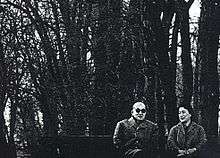Keiko Minami
| Keiko Minami | |
|---|---|
| Born |
12 February 1911 Toyama Prefecture, Japan |
| Nationality | Japanese |
| Known for | Aquatint, engraving |

Keiko Minami (南 桂子 Minami Keiko, 12 February 1911 – 1 December 2004[1]) was a Japanese artist, aquatint engraver, and poet.
Biography
Keiko Minami was born in Toyama Prefecture in 1911. She was orphaned at a young age, and expressed an early interest in the arts. She painted and wrote poetry in high school, and studied the art of children's stories under the Japanese novelist and poet Sakae Tsuboi. Her artistic style was influenced by such artists as Paul Klee, Yōzō Hamaguchi, Johnny Friedlaender, Yoshio Mori, and Japanese print artists. After the war, Minami moved to Tokyo to create children's books, and it was there that she met her future husband,[2] the mezzotint artist Yōzō Hamaguchi. Minami and Hamaguchi moved to Paris in late 1953 where Minami began studying under Johnny Friedlaender, a pioneer in aquatint etching.
Timeline
1911
- Born in Imizu District, Toyama Prefecture, Japan
1927-29
- Attended the School of Fine Arts Tokyo (東京美術学校), now called the Tokyo University of the Arts (東京藝術大学)
Late 1953
- Moved to Paris and began to study aquatint etching[3]
1959
- Named the official artist of the United Nations, 1959
1961
- Sold one of her early works to the city of Paris[4]
- Entered into a contract with German art dealer Heinz Berggruen
1982
- Moved to San Francisco with her husband, the mezzotint artist Yōzō Hamaguchi
1996
- Returned to Japan after more than forty years abroad[4]
2004
- Died in her early 90s
Career
Soon after beginning her study of aquatint etching under Johnny Friedlaender, Minami sold one of her early works to the city of Paris. In the late 1950s, Minami's works were reproduced and sold as greeting cards by both the Museum of Modern Art and UNICEF.[5] In 1961, Heinz Berggruen, a dealer in modern prints known for his collection of 20th-century masterpieces,[6] became Minami's exclusive art dealer.
Selected works
- Arbre de la paix (1958)
- Champs de printemps (1954)
- Bergère (1957)
- Lune (1954)
- Mer (1955)
- Trois sapins (1958)
Recurrent symbols in Minami's works
- Young Girls[7]
- Trees and Flowers
- Fish
- Dogs
- Churches and Towers
- Birds
- Water and Bodies of Water
- Mountains
Awards
- Official artist of the United Nations: "Tree of Peace," 1959
Bibliography
- Minami, Keiko. Bonheur. Tokyo: Little More,Japan
References
- ↑ "Minami Keiko". Kotobanku (in Japanese). Asahi Shinbun. Retrieved 3 July 2015.
- ↑ http://portlandartmuseum.us/mwebcgi/mweb.exe?request=record;id=8158;type=701
- ↑ http://www.portlandartmuseum.us/mwebcgi/mweb.exe?request=record;id=21363;type=101
- 1 2 http://portlandartmuseum.org/wp-content/uploads/2014/12/2014_BreakingBarriers_JapaneseWomenPrintArtists_1950-2000_Brochure.pdf
- ↑ "U.N.'s YULE CARDS GO ON SALE AGAIN". The New York Times. August 17, 1958. Retrieved 21 June 2015.
- ↑ Heinz Berggruen
- ↑ http://search.artmuseums.go.jp/search_e/sakuhin_list.php?sakka=850
External links
| Wikimedia Commons has media related to Keiko Minami. |